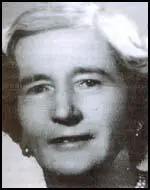Helen Grant

Helen Newsome was born in Clifton on 26th December 1903. After being educated privately in Bristol and Lausanne she studied Spanish and French at Somerville College (1927-30).
Newsome spent a lot of time in Spain during the early 1930s forming close friendships with several left-wing intellectuals, including Federico Garcia Lorca, Manuel de Falla and Fernando de los Rios. Her time in the country converted her to socialism.
Angela Jackson argues in her book, British Women and the Spanish Civil War (2002), that "Helen Grant is unusual in that she became interested in politics through first-hand involvement in Spanish events before the war, such as the student revolt in Granada in 1929. In this she differs from the majority of women whose political attitudes had been formed outside Spain and were applied to the Spanish situation."
In 1934 she began teaching Spanish at Birmingham University. She also married the economist Alexander Thomas Grant. On the outbreak of the Spanish Civil War she helped to raise funds for the Popular Front government.
In March and April 1937 Helen Grant worked as an interpreter for a group sent to Madrid by the Society of Friends. She wrote in her diary: "The main impression on walking about Madrid is that nobody even thinks about danger. Nevertheless, the majority of the houses and shops in the Gran Via have been hit... Although the guns roar almost continually and sometimes they are quite deafening, no one appears to take any notice."
On her return to England she was the Labour Party candidate in a by-election. During her campaign she called for the government to provide support to those fighting fascism in Spain.
During the Second World War Helen Grant worked for the Foreign Office, the BBC European Service and the United States Office of War Information.
After the war she was a lecturer in Spanish at Cambridge University. In 1966 she became a Fellow of Girton College.
Helen Grant died in June 1992.
Primary Sources
(1) Helen Grant, diary entry (April, 1937)
The main impression on walking about Madrid is that nobody even thinks about danger. Nevertheless, the majority of the houses and shops in the Gran Via have been hit... The telephone building is marked on every storey by shells although the rapidity with which the effects of bombardment are cleared up gives a superficial appearance of order.... Although the guns roar almost continually and sometimes they are quite deafening, no one appears to take any notice.

